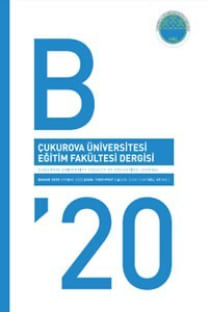Güzel Sanatlar Öğrencilerinin Devam Etmekte Olan Özel Amaçlı İngilizce Programları Hakkındaki Tutumlarının Değerlendirilmesi
Bu çalışma Türkiye’de özel bir üniversitedeki güzel
sanatlar alanında öğrenim gören öğrenciler için uygulanmakta olan Özel Amaçlı
İngilizce programlarının yeniden gözden geçirilmesini ve iyileştirilmesini
temel almaktadır. Programlar, Güzel
Sanatlar Fakültesi yöneticilerinin, öğrencilerin fakülte programlarının
bünyesinde gördükleri İngilizce öğreniminin yetersiz olarak değerlendirmeleri
nedeni ile daha etkili hale getirilmesi doğrultusundaki talepleri sonucu
oluşturulmuştur. Fakültedeki İngilizce öğrenimi yeniden yapılandırılırken,
öğrencilerin hazırlık okulunda sadece orta düzeyde (Intermediate) İngilizce
gördükten sonra İngilizce programlarına fakülte bünyesinde kredili dersler
olarak devam etmeleri, mevcut öğrencilerin yeni sisteme entegre edilmesi ve
daha önceden İngilizce programlarına zorunlu-kredisiz olarak katılan
öğrencilerin ise kalan derslerini aynı şekilde tamamlamaları öngörülmüştür. Bu
nedenle, bu çalışma, Güzel Sanatlar Fakültesindeki lisans öğrencilerinin, altı
aylık bir süredir devam eden bu iki tür İngilizce programlar hakkındaki
tutumlarını tanımlamayı amaçlamaktadır.
Anahtar Kelimeler:
Özel amaçlı İngilizce, Yeterlilik, Güzel sanatlar, İhtiyaç analizi, Öğrenci tavrı
Evaluating Fine Arts Students’ Attitudes towards Ongoing ESP Programs
This
research paper is based on the revision and improvement of on-going English for
Specific Purposes (ESP) programs developed for undergraduate fine arts students
of a private university in Istanbul, Turkey. The programs were originally
developed upon request from the faculty administration due to the need felt by
lack of adequate English language teaching in the faculty’s undergraduate
programs where in the new system the candidates were required to comply with
only the intermediate level preparatory course requirements to be eligible to
pursue their undergraduate programs. The students who had already complied with
the previous preparatory school requirements and who attended the undergraduate
programs were integrated into the new programs. They were required to take some
of the new courses - depending on the number of the previous English language
courses they had taken - as compulsory
non-credit courses. Thus, this paper seeks to identify the attitude the undergraduate
students of the Faculty of Fine Arts had towards the two kinds of on-going
programs which had been implemented for six months since their establishment.
Keywords:
ESP, Proficiency, Fine arts, Needs analysis, Learner attitudes,
___
- Brown, J.D. (1995). The elements oflanguage curriculum: A systematic approach to program development. Boston, MA: Heinle & Heinle.
- Cooper, R.L. (1989). Language Planning and Social Change. Cambridge: Cambridge University Press.
- Dudley Evans, T,. & St. John, M. J. (1998). Developments in ESP: A multidisciplinary approach. Cambridge, UK: CUP.
- Hutchinson, T. and Waters, A. (1987). English for Specific Purposes: A Learning-centred Approach. Cambridge University Press.
- Jordan, R. (1997). English for academic purposes: A guide Resource Book for Teachers. Cambridge: Cambridge University Press.
- Richards, J. C. (2001). Curriculum Development in Language Teaching. NY: CUP.
- Strevens, P. (1977). Special-purpose language learning: a perspective. Survey Article. Language teaching and Linguistics Abstracts10(3): 145-163. In
- Richards, J.C. (2001). Curriculum Development in Language Teaching, p. 33. NY: CUP.
- Halliday, M.A.K. (1985). Introduction to Functional Grammar.Edward Arnold, London.
- Lowe, I. 2009. Principles of ESP course design. www.scientificlanguage.com/swp/coursedesign.pdf.
- Vygotsky, L. (1986). Thought and Language.M.I.T. Press, Cambridge.
- ISSN: 1302-9967
- Yayın Aralığı: Yılda 3 Sayı
- Başlangıç: 2000
- Yayıncı: Çukurova Üniversitesi Matbaası
Sayıdaki Diğer Makaleler
Yükseköğretimde Proje Tabanlı Eğitim Programlarının Kuramsal Temelleri
Bülent GÜNDÜZ, Öner ÇELİKKALELİ
Development of the Parentified Child Scale-Adult Version: A Reliability and Validity Study
Tolga ZENCİR, Özlem HASKAN-AVCI
Buket BALLIEL ÜNAL, H.Gamze HASTÜRK
Demet SEVER, Dilruba KÜRÜM YAPICIOĞLU, Derya ATİK KARA
Evlilik Anlamına İlişkin Metaforik Bir İnceleme
Nilüfer ÖZABACI, Serdar KÖRÜK, Ahmet KARA
Pedagojik Formasyon Sertifika Programı Öğrencilerinin Eğitim İnançlarının İncelenmesi
